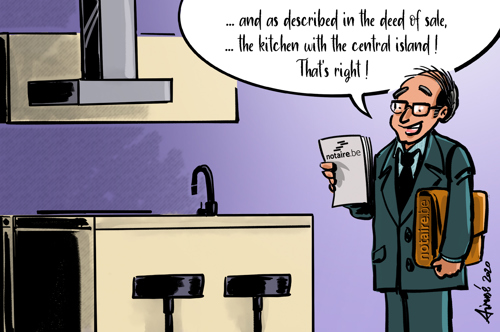- Construction Law , Liability and Insurance , Real Estate, Renting and Co-ownership
- notary , liability of notaries , notarial deed , building plans , supreme court
Recently, the Supreme Court delivered an important judgement on the notary's duty to inform the parties who appoint him when selling a property. Notaries can no longer simply escape from their liability by checking the description of a property in the deeds against the building plans.
1. Which general liabilities must a notary comply with?
In general, each notary has an obligation to assist all the parties.
This duty of assistance mainly involves the following three obligations, 1° the duty to provide information, advice and warnings, 2° the duty to investigate and research and 3° the duty to fulfill the formalities following the deed.
Within the scope of his investigation and research duty, the notary carries out the necessary research in order to have at his disposal the information that he must provide to the parties. In particular, the notary gathers and analyses all necessary and useful information resulting from the research.
Within the scope of his investigation duty, the notary checks the accuracy of the declarations of the parties as much as possible. He cannot simply assume that the information provided by the parties is correct.
As trusted advisor to both parties, he has the task of protecting the counter-party against wrong information.
This duty of assistance is a best efforts commitment, which is tested against the conduct of a normally careful notary placed in the same circumstances. Among other things, the knowledge and experience of the parties, their legitimate expectations and the information available to the notary are taken into account.
Previously, a notary public was not expected to check the factual accuracy of all the gathered information. He was not considered to be a detective and therefor he was not expected to conduct his own research on the reliability or completeness of the provided information. To fulfill his task sufficiently, it was enough for him to monitor the consistency of the information provided by the parties.
This stance on the notary's duties was generally accepted, until a recent case law of the Supreme Court gave a different direction.

2. What does the decision of 7 May 2020 of the Supreme Court brings us?
2.1 What is it about?
In the notarial deed of co-property concerning an apartment building that had yet to be erected, one of the apartments was described as having access to the garden via one of the bedrooms. The notarial deed of purchase also described the property in this way.
Afterwards it turned out that the apartment in question was built in accordance with the building plans approved by the authorities, but that it did not provide access to the garden via one of the bedrooms, where instead, only a round window was built.
The plaintiff accused the notary of 'manifest shortcomings' in the fulfillment of his research, investigation and information obligations. According to the plaintiff, the notary had committed a professional fault by including an erroneous description of the property concerned in both the deed of co-property and the notarial deed of purchase. Both notarial deeds stipulated that the apartment had access to the garden, whereas according to the approved plans handed by the plaintiff to the notary, this was not the case.
2.2 The position of the Supreme Court on this matter
Within the context of the obligations incumbent on a notary, the Court of Appeal ruled that, the notary could not be expected to verify the consistency of the description contained in the notarial deed with the description contained in the approved building plans, even if he had them in his possession.
Therefore, according to the Court of Appeal, the notary could not be expected to compare the description contained in his deeds with the description contained in the approved building plans.
According to the Supreme Court, the Court of Appeal did not legally justify its decision that the notary did not commit a fault, in view of two considerations:
- Firstly, because the Court of Appeal failed to examine in concreto whether or not the fact that the notary is not expected to compare the description in the deeds with the actual building plans also applies to the drafting of the deeds relating to the construction of an apartment building;
- Secondly, in so far as the Court holds that the notary is not liable because the plaintiff himself was negligent and, therefore, the plaintiff must bear the consequences of its own negligence. Within this context, the Supreme Court points out that there is a causal link between fault and damage if, in the absence of a fault, the damage could not have arisen as it did in that specific situation.
In other words, the judgment of the Court of Appeal is rejected by the Supreme Court.
This implies that a notary cannot assume that his liability will be excluded, on the grounds that it is not considered his duty to verify the consistency of the description contained in the deeds against the description contained in the building plans, nor because one of the parties has been negligent.
This means that a notary can no longer simply assume that he is not expected to check the conformity between the description of a property in the deeds and the description in the approved building plan.
3. Conclusion
With this decision, the Supreme Court confirms that within the scope of his research, information and assistance duties, the notary must check whether the real estate described in his deeds - both in the ordinary deed of sale as in the deed of co-property - is actually consistent with the building plans and - in so far as the real estate has already been built - with the actual situation.
Notaries are hereby warned that their professional liability in the event of failure to comply with this heavy duty to provide information, may be at stake.











